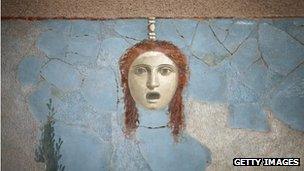British Museum's Pompeii boosts record visitors in 2013
- Published

The Pompeii exhibition opened in March
The British Museum's Pompeii and Ice Age exhibitions have helped attract record numbers of visitors this year, the museum's annual report has said.
The museum has had 1.7m visitors since the start of April, 25% up on 2012, and was the UK's most popular cultural attraction for the sixth year running.
Visits in May were up 42% up on last year and were the highest on record.
"What's really pleasing about those figures is that visitors are so young," said museum director Neil MacGregor.
The report for 2012/13 said the 43% of visitors were aged between 16-34.
Future shows will include an in-depth look at sex in Japanese art and an exhibition on Germany in 2014 to mark the 25th anniversary of the fall of the Berlin Wall.
Most popular exhibitions
"Germany is a critical force in the shaping of Europe," Mr MacGregor told the BBC. "We want to look at the long history of Germany and how German identity is shaped by elements from its deep past.
"Most of us in Britain tend to think of German history as essentially from 1914 to now. They are hugely important years but they are part of a much longer story."
The current blockbuster show Life and Death in Pompeii and Herculaneum achieved its original visitor target of 250,000 in three months of a six-month run.
It is on course to be the third most popular charging exhibition in the British Museum's history - after 1972's Treasures of Tutankhamun and 2007's The First Emperor: China's Terracotta Army.
The exhibition Shakespeare: Staging the world was seen by more than 105,000 visitors, while Ice Age Art closed in early June with more than 90,000 visitors - a 133% increase on the original target of 40,000.
Overall, the British Museum had more than 5.575 million visitors in 2011/2012, slightly down on the previous year's 5.8 million visitors.
Mr MacGregor also said the British Museum would have to "think very carefully" how to accommodate an expected 5% cut in government funding to museums for 2015-2016.
"We don't know what we'll be able to continue to do, or what we'll have to reduce," he said. "Here you have very successful museums in London and how we can keep offering to our visitors what they want is going to be the big challenge."
- Published11 June 2013
- Published26 March 2013
- Published25 March 2013
- Published14 June 2013